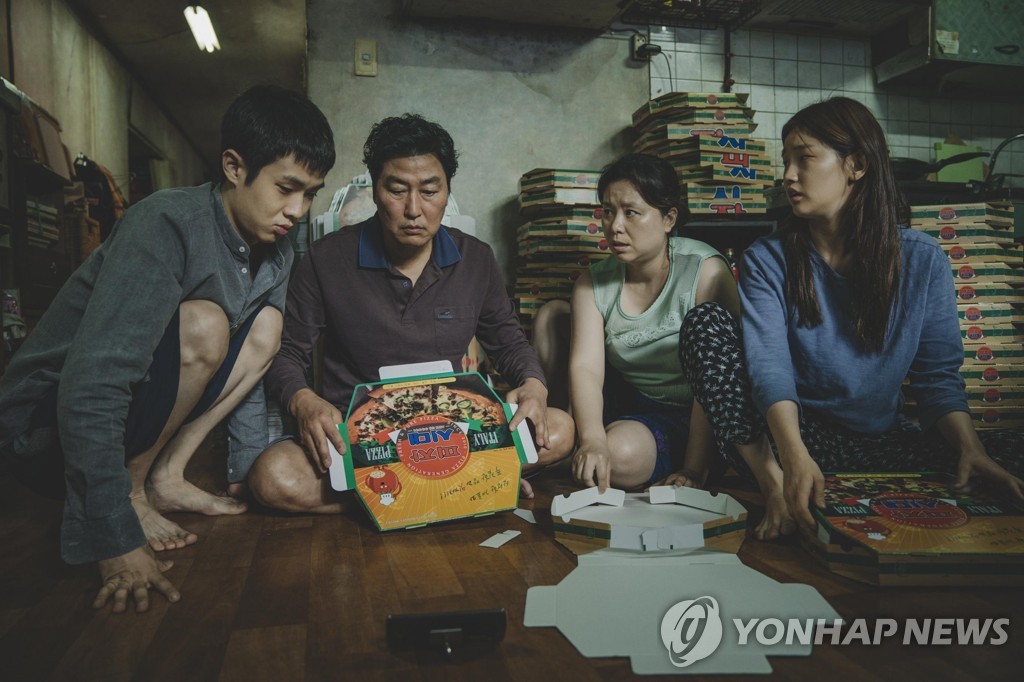- California Assembly OKs highest minimum wage in nation
- S. Korea unveils first graphic cigarette warnings
- US joins with South Korea, Japan in bid to deter North Korea
- LPGA golfer Chun In-gee finally back in action
- S. Korea won’t be top seed in final World Cup qualification round
- US men’s soccer misses 2nd straight Olympics
- US back on track in qualifying with 4-0 win over Guatemala
- High-intensity workout injuries spawn cottage industry
- CDC expands range of Zika mosquitoes into parts of Northeast
- Who knew? ‘The Walking Dead’ is helping families connect
Bong Joon-ho’s ‘Parasite’ depicts a microcosm of Korean society
Bong Joon-ho’s “Parasite” tells a tragicomic story of two families, one rich and one poor, who become entangled in a string of mishaps. But there is more to this film than that.
“Parasite” hooks its audience with laughs early on, then segues to fine-tuned suspense, mystery and horror. The gears change so quickly and so smoothly that viewers don’t even notice until the end.
The movie starts by depicting the miserable life of Ki-taek (played by Song Kang-ho)’s family, living in a ramshackle semi-basement. They look for a few bars of free wi-fi and eke out a living working for peanuts. They have no hope that their lives will improve.
But change does come as Ki-woo (Choi Woo-shik), Ki-taek’s college-age, quick-thinking son, gets a chance to take over his handsome friend’s job tutoring the teenage daughter of a rich businessman, Mr. Park (Lee Sun-kyun).
With forged credentials, Ki-woo enters the opulent mansion somewhere on an uptown hill and meets Mr. Park’s pretty but gullible and unworldly wife, Yeon-kyo (Cho Yeo-jeong).


This image, provided by CJ Entertainment, shows a scene in “Parasite.” (Yonhap)
The wily Ki-woo passes the interview to take on the love-struck daughter and spots an opportunity to also get his sister, Ki-jung (Park So-dam), a job in the spacious granite villa.
The sibling’s scam expands in a devil-may-care way to create two positions for their parents. Ki-taek becomes the driver and Chung-sook, their mother, replaces the veteran housekeeper. All of them now live off Mr. Park’s wealth.
From here, the film starts to expose the tensions between surface-level fineness and subterranean nuisance. Ki-taek’s family seems to fall into a sweet illusion that they could escape their grotty, squalid semi-basement home or dream a co-existence.
But Mr. Park, who is gentle and demure, heaps praise on his new driver for not “crossing the line,” although he often complains of Ki-taek’s unpleasant odor, which is a prevalent metaphor throughout the movie.
It is more devastating and frustrating that everything goes wrong and crashes down due to the insurmountable class division and a struggle among the poor.
Bong said he wanted to tell a story about a stratified society through two families at the extreme ends.
“Family is the very basic unit of a society and the most common group of people around us,” Bong told reporters after a media preview in Seoul. “I tried to illustrate the lives of the two extreme families without using socioeconomic words, like polarization.”
The eclectic director fused a lot of genres and threads from his previous works into this one, bringing up images from “Memories of Murder,” “The Host,” “Mother,” and “Snowpiercer.”
His sarcastic message comes through clearly, as the film’s characters, candid cinematography and artful mise-en-scene effectively show the sharp contrast between the haves and have-nots.
But the underlying humorous tone and warm eyes on the destitute family help lessen the film’s caustic tongue that makes viewers uncomfortable.
The winner of Palme d’Or at the 72nd Cannes Film Festival, “Parasite” opens in South Korean theaters Thursday.











